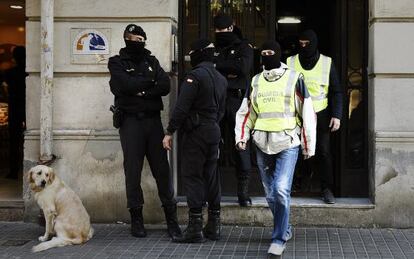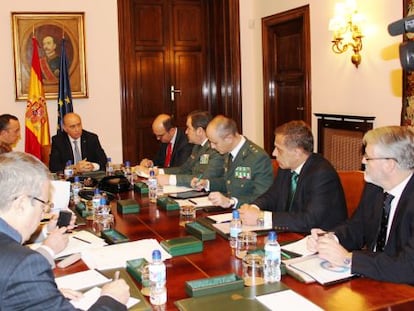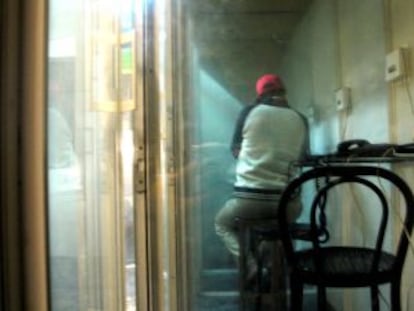Spanish police arrest two men in Girona accused of financing ISIS
Interior Ministry says investigators have traced transfers end to end for the first time

Spanish police arrested two brothers in the northern city of Girona accused of helping to fund the so-called Islamic State's operations in Syria and Iraq, the interior ministry said on Wednesday.
The two Moroccans, aged 22 and 32, and who have not been identified, diverted funds from Europe to pay for the transfer of members of the militant group into conflict zones, the ministry said.
They are charged with financing terrorism, collaboration with a terrorist group and indoctrination, sent money to Islamic State administrators operating under false identities, it added. A search of the two men’s homes was later carried out.
Interior Ministry sources said that a third brother was involved in the funding, but is believed to have died fighting in Syria. The three had used false identities provided by ISIS.
Counter-terrorism experts say the large number of raids against jihadism in Spain has very possibly contributed to the prevention of terrorist actions here
Police say the supposed false identities are part of ISIS’s international fundraising network.
The death of the one of the brothers in Syria, who had travelled to the country with his wife and children to join ISIS, did not end their fundraising activities in Spain. Authorities say they used recent legislation to tackle money laundering in order to trace the international money transfers the cell was making.
This is the first time Spanish police have been able trace remittances to ISIS, establishing that the money was put at its disposal and used primarily to fund recruiting costs.
Spain increased its anti-terrorist alert to level 4 on June 26, since when the Civil Guard has extended its investigations into suspected ISIS cells. An Interior Ministry spokesman highlighted the importance of preventing ISIS from recruiting and fundraising in Europe.
In early 2015, EL PAÍS reported on how Spain has become a major financing hub for jihadist terrorists in Syria and Iraq through an extensive network of 250 phone call centers, butcher shops and neighborhood grocery stores, where money is transferred through an informal and virtually untraceable system, according to Spanish intelligence agencies.
This network, which uses the so-called hawala system – defined by Interpol as money transfer without money movement – manages the savings of over 150,000 Muslims without any legal oversight, and is also being used to help fund terror groups such as Islamic State (ISIS) and al-Nusra Front, an Al Qaeda affiliate.
Hundreds of young residents in Spain – mostly Moroccans – have joined ISIS. At least 13 have died in suicide missions that caused dozens of deaths among Syrian President Bashar al-Assad’s military forces. Top intelligence security officers admit they have no exact numbers on how many have traveled to Syria to join other jihadists. “It is impossible to know,” said one supervisor.
The secret hawala network in Spain is comprised of about 300 hawaladars – the majority of them Pakistanis – who run clandestine offices in Barcelona, Tarragona, Lleida, Bilbao, Santander, Valencia, Madrid, Logroño, León, Jaén and Almería, and other cities with large Pakistani communities.
Sign up for our newsletter
EL PAÍS English Edition has launched a weekly newsletter. Sign up today to receive a selection of our best stories in your inbox every Saturday morning. For full details about how to subscribe, click here
The number of judicial investigations into Islamist terrorism has been growing at a fast pace in recent years. In 2014 there were 104, twice as many as in 2013, according to data released by the High Court’s prosecutor office.
Spain has carried out more operations against ISIS than any other European country so far.
Last year, more than 90 individuals were arrested in connection with Islamist terrorism, nearly twice as many as in 2014 (46) and over four times as many as in 2013 (21).
Counter-terrorism experts said the large number of raids against jihadism in Spain “has very possibly contributed to the prevention of terrorist actions in our country.” At the same time, “it could have become another source of threat, as it demonstrates that Spain is a country that efficiently combats these groups.”
English version by Nick Lyne.









































